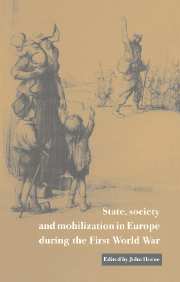Book contents
- Frontmatter
- Contents
- List of contributors
- Preface
- 1 Introduction: mobilizing for ‘total war’, 1914–1918
- I National ideals
- II Solidarities and minorities
- III Army and nation
- 8 Discipline and morale in the British army, 1917–1918
- 9 Remobilizing the citizen-soldier through the French army mutinies of 1917
- 10 The German army, the authoritarian nation-state and total war
- 11 Morale and patriotism in the Austro-Hungarian army, 1914–1918
- IV The limits and consequences of mobilization
- Notes
- Index
11 - Morale and patriotism in the Austro-Hungarian army, 1914–1918
Published online by Cambridge University Press: 04 December 2009
- Frontmatter
- Contents
- List of contributors
- Preface
- 1 Introduction: mobilizing for ‘total war’, 1914–1918
- I National ideals
- II Solidarities and minorities
- III Army and nation
- 8 Discipline and morale in the British army, 1917–1918
- 9 Remobilizing the citizen-soldier through the French army mutinies of 1917
- 10 The German army, the authoritarian nation-state and total war
- 11 Morale and patriotism in the Austro-Hungarian army, 1914–1918
- IV The limits and consequences of mobilization
- Notes
- Index
Summary
Looking back on the final years of Austria-Hungary, Field Marshal Conrad von Hötzendorf wrote bleakly in December 1924 that the empire should have followed Franz Josef to the grave in November 1916 instead of struggling on for a further two years. Neither the Monarchy nor its last Emperor, Karl, had been permitted a dignified exit from the European stage. Conrad might have added that this applied also to himself. He remained notoriously embittered that in February 1917 Karl had replaced him as chief of the General Staff, dispatched him to command Habsburg forces in the Tyrol, and then made him the scapegoat for the failed offensive of June 1918. Yet Conrad's frustration under Karl's ‘new regime’ was not purely personal. He resented perhaps even more the weakened status of the Austro-Hungarian military. This had begun months before Franz Josef's death when, with the creation of a joint High Command for the central powers in the aftermath of the disastrous Brusilov offensive, the Austrian High Command (AOK) had been made subordinate to the German military leadership. Conrad spoke caustically at the time of the beginning of a ‘Ludendorff era’. This affront was then compounded by the Habsburg military's growing weakness within the Monarchy itself. From August 1914 the AOK had tried to run a military dictatorship in the Austrian half of the empire, but their effectiveness outside the immediate war zones had been successfully restricted by Count Stürgkh, the Austrian Prime Minister (supported by his Hungarian counterpart, István Tisza, who blocked any military imposition on the kingdom of Hungary).
- Type
- Chapter
- Information
- Publisher: Cambridge University PressPrint publication year: 1997



